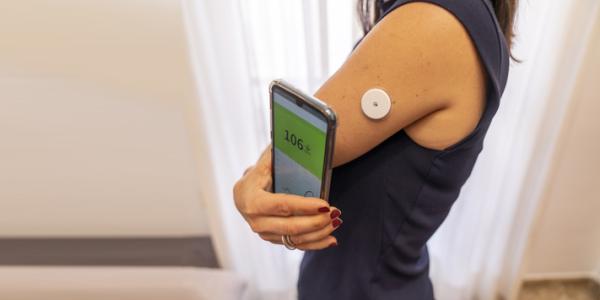
The future of health technology is evolving at a rapid pace. Let's take a look at advancements in wearable tech and consider current devices and apps that can make living a healthy lifestyle easier.
請點擊此轉換成中文
Current health accessories (such as smart watches) can track lifestyle habits from sleep to caloric intake. But advancements haven't stopped there — and health experts continue to look for ways to make managing diseases, promoting healthy lifestyles and even navigating through pandemics, easier.
Skip
The future of health tech
Smart watches and wearable trackers have been around for years and have helped millions of people monitor steps, heart rate and general health. But with the pandemic, researchers have leveraged the capabilities of these devices (and others) to do something more — detect disease.
Face masks are a part of life for helping contain COVID-19 spread, but what if they could monitor breathing patterns and airborne pathogens and alert you of a possible COVID-19 or flu infection? Other possible advancements include smart eye lenses that could monitor for eye pressure, or microneedle patches that could detect inflammation and monitor glucose or protein levels. Even electronic tattoos have been explored as a way to keep an eye on stress biomarkers (such as cortisol).
Advancements along these lines could help with early detection of cancers, chronic diseases and other acute illnesses. Early detection leads to earlier diagnosis and can save more lives. These innovations could also be life-changing for the millions of people who currently suffer from diabetes and other chronic illnesses.
Embrace technology for healthier living
Technology can be your friend and help you live a healthier life. It's apparent in all the healthcare and health-managing technologies that now exist and continue to be developed. Some other new devices, technology and apps that can assist in your health journey include:
Devices:
- At home allergy testing (metabolic panels). If you think you have allergies but aren’t sure what you are allergic to, an at-home test may be a convenient way to give you some insight. Of course at-home testing isn’t a replacement for a doctor — if you suffer from prolonged allergy symptoms, meet with a doctor or specialist to discuss.
- Stroke sensors. As stroke patients recover, these electromyography sensors can help in that rehabilitation process by monitoring muscle response, activity and contractions.
- Genetic testing. Genetic test kits have become popular gifts. They can provide a wealth of information regarding your origins, ethnicity and possibly even lead you to unknown relatives. They can also alert you to unknown family health history and health risks. Popular genetic test kits include AncestryDNA test and 23AndMe.
- Wearable defibrillators. These defibrillators constantly track heart rates, and if a dangerous heart rhythm is detected, can send a shock to the wearer's heart to restore a normal rhythm. Though quite costly, devices like these might make a big difference in the lives of people who suffer from arrhythmia or tachycardia.
- Asthma monitoring. Asthma attacks can happen suddenly and might not be obvious until the later stages. But current wearable tech (watch bands) can monitor and predict oncoming attacks, helping the wearer to take medicine faster prior to noticing symptoms.
- Concussion protection. Sports and other fun activities can unfortunately lead to concussions and serious injury. But the Q-Collar (FDA approved) can help protect the brain against severe impact.
- Medical alert sensors. If you or a loved one is elderly and lives alone, a common worry is injury from falling, but modern medical alert sensors (often bands around the wrist) can sense when someone falls and contact 911 medical services.
Apps:
- Talkspace. This therapy app makes getting the emotional and mental help you need more accessible than ever. The days of setting up appointments months in advance are mostly gone.
- Mealime. Many of us don't have much time to cook but want to avoid ordering take-out every night. Mealime makes meal prep easier by considering personal interests and allergies then suggests grocery lists and recipes for your entire week.
- Calm. Thousands of people struggle with sleep quality all over the world. Calm can aid in better sleeps through peaceful meditations.
- Pathways. This app is for anyone who’s suffering from pain and illness for over three months — it includes a step-by-step program for pain management and care.
- Cerebral. Affordable with or without insurance, Cerebral offers care to anyone who suffers from depression, insomnia and anxiety by giving you access to therapists, nurses, physicians and more.
- Glucose Buddy. This app can connect your glucometer and instantly help you log numbers, meals and exercise and then give you a report and other metrics.
- Happier Meditation. If you're skeptical about meditation, this app is great for you. Ten Percent Happier starts with the basics and can show you the healthy benefits of taking time aside to relax.
- Branch. If you live with chronic pain or illness, this app can help you track symptoms, find resources and help manage prolonged struggles.
- Bearable. Store all your health information in one place. From health records to personalized entries, see how your health is being affected.
From the latest advancements in technology to more user-friendly apps, there are plenty of ways these marvelous advancements can place healthcare right into your hands and be incorporated into your daily and weekly routine. Try some of these suggestions, or consider some of them as gifts for your loved ones.
This article first appeared in the December 2021 edition of the HealthPerks newsletter.

